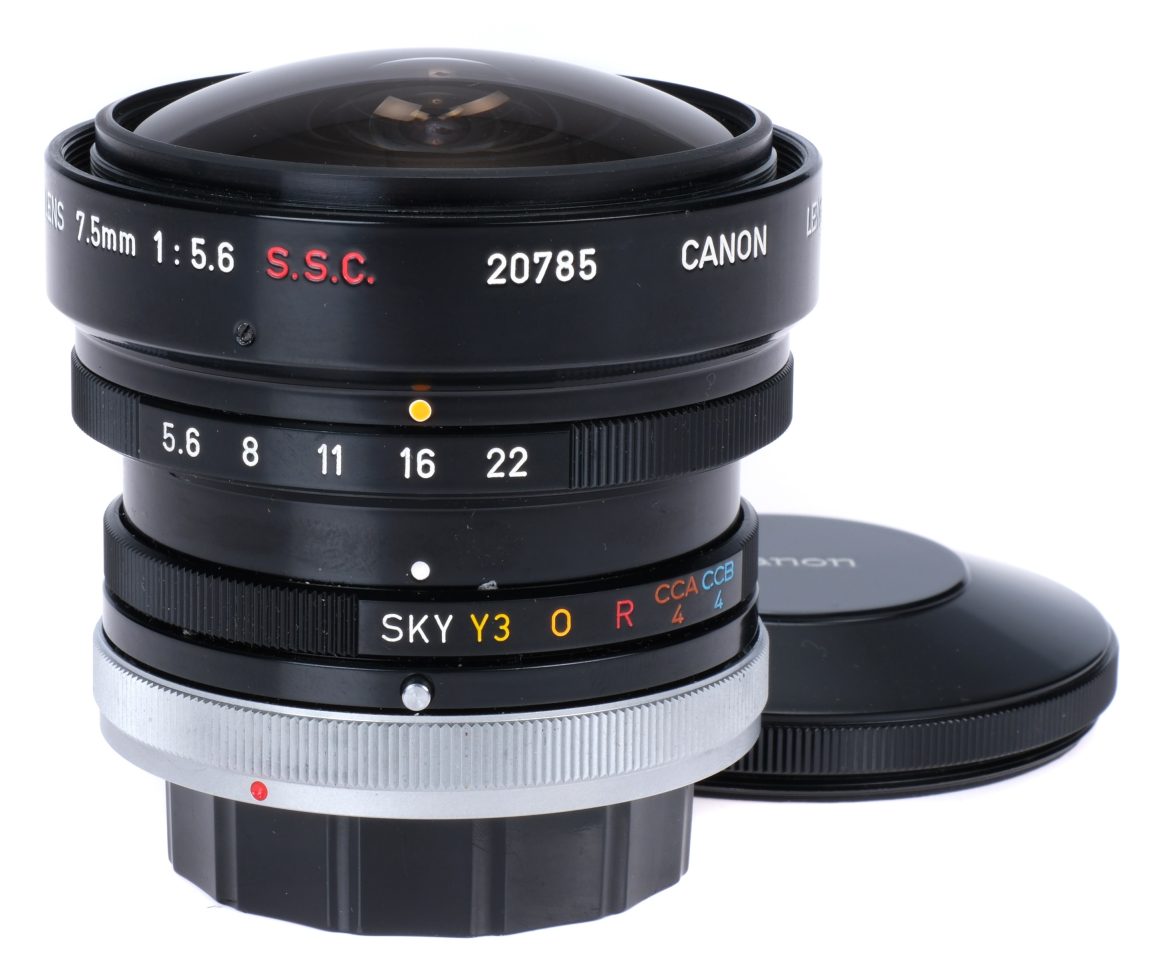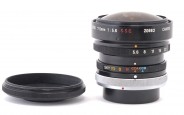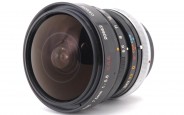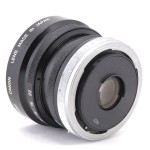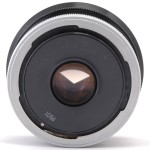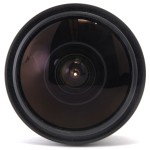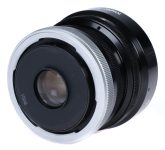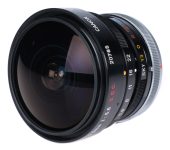Canon FD 7.5mm F/5.6 S.S.C. Fisheye
Fisheye lens • Film era • Discontinued
- Announced:
- · February 1973
- Production status:
- ● Discontinued
- Country of design:
- · Japan
- Original name:
- · CANON FISH-EYE LENS FD 7.5mm 1:5.6 S.S.C.
- Class:
- · Slow full-frame circular fisheye lens
- · Professional model (Top class)
- System:
- · Canon FD (1971)
Abbreviations
| FD | The lens is designed for Canon 35mm film SLR cameras with the Canon FD mount. |
| S.S.C. | Multi-layer Super Spectra coating is applied to the surfaces of lens elements. This anti-reflection coating increases light transmission, eliminates flare and ghosting, and maintains color consistence among all lens models. |
| FISHEYE | An ultra-wide angle lens with strong uncorrected barrel distortion and extreme angle of view. |
Model history (3)
| ■Canon FD 7.5mm F/5.6 Fisheye | M | 11 - 8 | 0.30m | -- | 1971 ● | |
| ■Canon FD 7.5mm F/5.6 S.S.C. Fisheye | M | 11 - 8 | 0.30m | -- | 1973 ● | |
| ■Canon FDn 7.5mm F/5.6 Fisheye | M | 11 - 8 | 0.35m | -- | 1979 ● | |
Specification
| Optical design: | |
| 35mm full frame | |
| 7.5mm | |
| F/5.6 | |
| 11 elements in 8 groups | |
| Fixed focus | |
| Circular fisheye | |
| Canon FD [42mm] | |
| 180° | |
| Diaphragm mechanism: | |
Diaphragm type: | Manual |
Aperture control: | Aperture ring |
| 6 (six) | |
| Focusing: | |
| 0.30m | |
| 1:37 | |
Manual focus control: | None |
| Physical characteristics: | |
| 380g | |
| ⌀72×62mm | |
| Accessories: | |
| Removable front filters are not accepted | |
| Built-in SKY, Y3, O, R, CCA4, CCB4 (part of the lens optical system) | |
| Not available | |
| Canon Extender FD 2X-B → 15mm F/11.2 |
Sources of data
- Canon FD instructions (PUB. II01-012A) (October 1978).
- Canon FD lenses booklet (PUB. CE1001J) (December 1974).
- Canon FD interchangeable lenses instructions (PUB. A5368) (February 1974).
- Canon interchangeable lenses sales guide.
- Canon AE-1 booklet (PUB. CE1057) (June 1976).
- Canon EF instructions (PUB. IE 1008P) (May 1976).
- Canon F-1 booklet (PUB. CE1017F) (December 1975).
- Canon AT-1 booklet (PUB. CE1065) (November 1976).
- Canon F-1 booklet (PUB. NO5367Q) (September 1974).
- The pinnacle of optical perfection. Canon FD lenses booklet (PUB. CE1006F) (March 1973).
- Canon FD lenses inctructions (PUB. A5368z) (January 1978).
- Canon FD lenses booklet (PUB. CE-1006J) (September 1974).
- Canon FD Lenses in a Nutshell booklet (PUB. IE-1033Q) (April 1979).
- Canon AE-1 - A new generation booklet (PUB. CE1056A) (July 1976).
- Canon Products Guide (PUB. E5077t) (April 1978).
- Canon Products Guide (PUB. D5077k) (November 1975).
- Canon AT-1 booklet (PUB. CE1074H) (December 1977).
- Canon EF instructions (PUB. IE 1008L) (September 1975).
- Canon Products Guide (PUB. D5077n) (February 1976).
- Canon Products Guide (PUB. D5077s) (August 1976).
Manufacturer description #1
This is a equidistant projection type of fish-eye lens which expands the use of the FD series of lenses and the Canon F-1 system. A 180° angle-of-view is taken in a 23mm diameter circle in the 24mm x 35mm picture frame. An 11-element, 8-component construction, it has six built-in filters.
Its reduced size is the same as that of standard lenses.
Because it is equipped with an equidistant projection mechanism, it is ideal for photographing astronomical and azimuth phenomena. When used in ordinary photography, it is particularly suitable in achieving special effects.
It can be used to see the field-of-view through the viewfinder without fixing the mirror upward.
Manufacturer description #2
This is an equidistant-projection fish-eye lens that covers an angle of 180°. The resulting image is a 23mm-diameter circle. This lens was originally developed for academic purposes, but now it is frequently used for artistic and other purposes because of its characteristic circular image.
Since fish-eye lenses have a short focal length, close to the film plane, the mirror usually has to be raised before photographing. However, with this Canon fish-eye lens, this inconvenience is eliminated. This lens has a built-in filter mechanism with SKY, Y3, O, R, CCA4 and CCB4 filters. Exposure is manually set and focus does not have to be adjusted because of its deep depth of field.
Manufacturer description #3
This is a real fish-eye lens of the equidistant projection type, with a picture plane diameter of 23mm and covers a picture angle of 180°. Of the retrofocus type, with 11 elements in 8 groups, it has six built-in filters. Field of view can be seen through the viewfinder without having to lock the mirror up.
Typical characteristics of fisheye lenses
- Extreme angle of view (at least 180° diagonally);
- Circular types (the image circle of the lens is inscribed in the image frame) or diagonal types (cover the entire image frame);
- Usually of equidistant projection type, with the distance from the picture center to any given point always proportional to the angle from the optical axis to that point;
- Huge barrel distortion;
- Short closest focusing distance (0.20 - 0.30m with 35mm full-frame prime lenses);
- Very large depth of field, eliminating the need for autofocus or precise manual focusing;
- Due to the extreme angle of view and convex front element, front filters cannot be used;
- Often equipped with a filter turret with swivel-mounted filters;
- Often come with a small, built-in petal-shaped lens hood.
From the editor
The lens features fixed focus design: there is no focusing ring and everything is in focus from the closest focusing distance of 30 cm to infinity.
Other fisheye lenses in the Canon FD system
| ■Canon FD mount (4) | |||||||||
| Canon FD 7.5mm F/5.6 Fisheye | M | 11 - 8 | 0.30m | -- | 1971 ● | ||||
| Canon FDn 7.5mm F/5.6 Fisheye | M | 11 - 8 | 0.35m | -- | 1979 ● | ||||
| Canon FD 15mm F/2.8 S.S.C. Fisheye | A | 10 - 9 | 0.30m | -- | 1973 ● | ||||
| Canon FDn 15mm F/2.8 Fisheye | A | 10 - 9 | 0.20m | -- | 1980 ● | ||||
Lenses with similar focal length
| ■Canon FD mount (3) | |||||||||
| Sigma MF 8mm F/4 Fisheye | A | 10 - 6 | 0.20m | -- | 1988 ● | ||||
| Sigma MF 8mm F/4 Fisheye ZEN | A | 10 - 6 | 0.20m | -- | 1992 ● | ||||
| Sigma MF 8mm F/4 Filtermatic Fisheye | A | 11 - 7 | 0.20m | -- | 1982 ● | ||||
| ■Interchangeable mount (2) | |||||||||
| BelOMO Peleng A 8mm F/3.5 Fisheye MC [T] | P | 11 - 6 | 0.22m | -- | ● | ||||
| Spiratone 7mm F/5.6 Fisheye [T] akaHanimex 7mm F/5.6 Fish-eye | P | ? - ? | -- | ● | |||||
